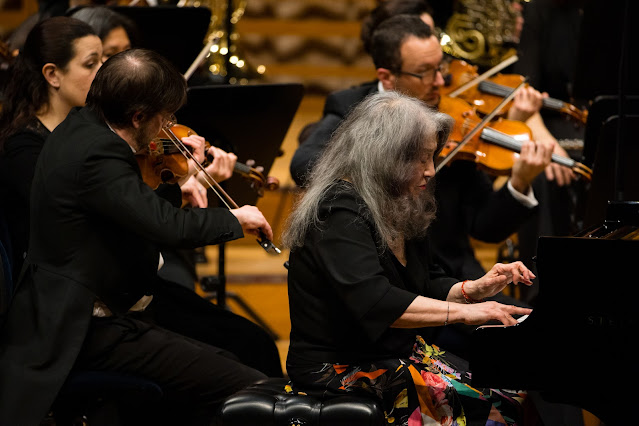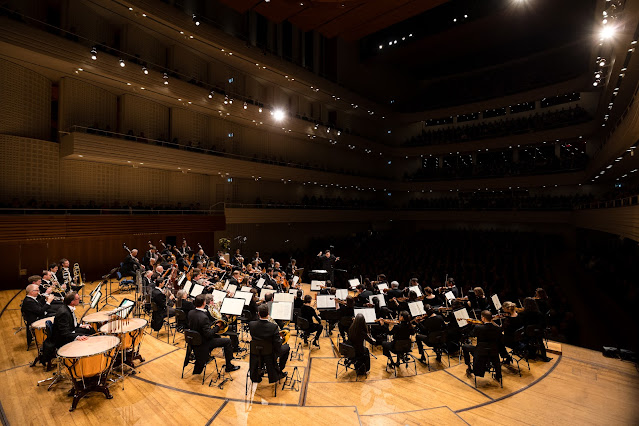 |
| Schumann: Piano Concerto - Martha Argerich, Lucerne Symphony Orchestra - Le Piano Symphonique, KKL Luzern (Photo: Philipp Schmidli) |
Brahms: Symphony No. 3, Schumann: Piano Concerto; Martha Argerich, Lucerne Symphony Orchestra, Michael Sanderling; Le Piano Symphonique at KKL Luzern
Argerich gives a remarkably intimate performance of Schumann's concerto in an evening notable for fluidity, flexibility and a chamber-like orchestral balance
After two cancelled TGVs and three cancelled flights, I finally made it to the Lucerne Symphony Orchestra's piano festival, Le Piano Symphonique at KKL Luzern (Culture and Congress Centre, Lucerne). The festival had opened on 7 February 2023 with pianist Rudolph Buchbinder in Mozart, Beethoven and Schumann, followed by what was reportedly a remarkable concert when Jean Rondeau gave a harpsichord recital, playing Rameau, Couperin and Pancrace Royer in a swimming pool (emptied of water).
I caught up with the festival on 8 February 2023, when pianist Martha Argerich joined the Lucerne Symphony Orchestra under its music director Michael Sanderling for Schumann's Piano Concerto and the programme began with Brahms' Symphony no. 3.
 |
| Brahms: Symphony No. 3 - Lucerne Symphony Orchestra, Michael Sanderling - Le Piano Symphonique, KKL Luzern (Photo: Philipp Schmidli |
The Konzertsaal at KKL is a handsome modern auditorium, traditional rectangle in shape with three shallow balconies and the stage lined with wood. The acoustic seemed warm and true, certainly the subtleties of balance that Sanderling brought to the Brahms were highlighted as were the moments when Martha Argerich's performance of the Schumann became an intimate recital.
The opening of the symphony felt quite deliberate, but Sanderling brought the lovely wind solos to the fore and in the second subject, which went with a nice swing, there was a lovely wind interplay too. The strings were numerous and very present, yet never overwhelming in the mix. This was a performance of beautiful detail and superb balance, with many inner parts phrased finely and with clarity. During the development the music seemed to almost want to move towards Ravel's La Valse, a somewhat unexpected link. But Sanderling created an intriguing mix of intimacy and drama, this was certainly not a monumental account of the work, instead there was a Schumannesque fluidity to it.
The Andante began with intimate, shapely wind solos answered by delicate strings, a chamber feel to the whole with the spareness of Brahms' writing making the piece feel modern. The Scherzo was back to the waltz again, and the cello melody gave us hints of Dvorak in a similar vein. The wind were to the fore in the trio, again with a chamber music feel. The finale started in an intimate and dark way, perhaps with not enough contrast to the scherzo. Flashes of drama never stayed long until, finally, Sanderling unleashed the beast but still the music would return to the world of intimacy and fluidity. This was the least monumental of performances and all the better for it.
Martha Argerich is now 81 and her presence at a concert not completely guaranteed. The idea of celebrating Robert Schumann with Martha Argerich in the concerto was born ten years ago, and successfully brought to fruition, and indeed the piano music of Schumann is a thread through this year's festival. The concerto's opening gesture was certainly dramatic in both orchestra and soloist, but then some lovely woodwind solos led to Martha Argerich's intimate response that really drew you in. She did not make the solo part innately bravura, instead playing with a lovely fluidity and flexibility with flashes of drama, and in the busy passages she almost accompanied the wind solos with just fragments of melody coming to the fore.
Throughout, it was the daringly intimate moments that you noticed, and this continued in the Intermezzo which seemed like a piano solo with strings answering. The basic speed was quite steady, allowing for the rhythmic subtlety of Argerich's performing, creating sheer magic. After a zesty opening, the Allegre vivace was a real dialogue between solo and orchestra, with Argerich giving a poetic cast to the more bravura moments, yet generating some remarkable excitement.
This was an affectionate and poetic account of the concerto, and for all Aragerich's use of quiet intimacy, it felt natural and not over artful. But what I took away most were the moments where Argerich's intimate playing had a response in the beautifully phrased wind solos.
My thanks to the Lucerne Symphony Orchestra for their support in bringing me to the festival.
Never miss out on future posts by following us
The blog is free, but I'd be delighted if you were to show your appreciation by buying me a coffee.
Elsewhere on this blog
- Unexpected creativity: cellist Margaret Maria and soprano Donna Brown talk about the joys of collaboration on the words and music of their album Between Worlds - interview
- Galina Grigorjeva: Music for Male-Voice Choir - record review
- Peter Grimes in Paris: a powerful performance from Allan Clayton as he leads the Paris revival of Deborah Warner's striking production - opera review
- A virtuosic cascade of ecstatic and endless deep listening: The Hermes Experiment with Shiva Feshareki - concert review
- Part of her musical journey: violinist Esther Yoo chats about recording the Barber and Bruch concertos - interview
- Mangling Médée: why are stylistically appropriate performances of Cherubini's opera so rare? - feature
- Faces in the Mist: the first disc devoted to Richard Peat's striking and evocative music - record review
- Lyricism, melancholy & sadness: pianist Ruth McGinley & composer Neil Martin collaborate on Aura - record review
- Style and elegance: with Bach-Abel Society, Les Ombres take us back to the elegant evenings of the Bach-Abel concerts in 18th-century London - record review
- Party! London's LGBT+ community choir, the Pink Singers celebrate 40 years at the Cadogan Hall - concert review
- Aural Adventures: the Colin Currie Quartet and Liam Byrne launch Sound Unwrapped at Kings Place - concert review
- Home











No comments:
Post a Comment